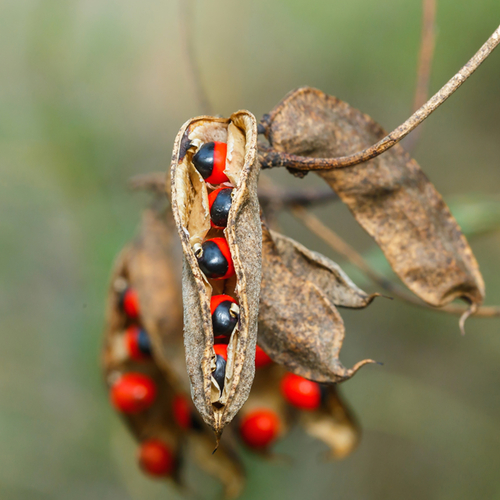
Background
Jequirity is poisonous. Despite serious safety concerns, some people take jequirity by mouth for asthma, constipation, liver disease, and other conditions. But there is no good scientific evidence to support these uses.
Safety Safety definitions
When seeds come in contact with the skin, they can cause swelling, irritation, and severe eye problems.
Special Precautions & Warnings:
While jequirity bean isn't safe for anyone to take, some people should be particularly careful to avoid use.Pregnancy and breast-feeding: Jequirity is LIKELY UNSAFE when taken by mouth during pregnancy or breast-feeding. Jequirity contains a chemical called abrin, which is a poison. Also, jequirity might cause labor to start. Avoid use.
Children: Jequirity is UNSAFE in children. Children are attracted to the bright colors of the seed, which is unfortunate since children are particularly sensitive to the toxic effects of jequirity bean. Children can die after swallowing just one seed. If exposure to jequirity bean is suspected, get immediate medical assistance.
Bleeding disorder: Jequirity might slow blood clotting. In theory, this might make bleeding disorders worse.
Diabetes: Jequirity might lower blood sugar. Watch for signs of low blood sugar (hypoglycemia) and monitor your blood sugar carefully if you have diabetes and use jequirity.
Surgery: Jequirity might slow blood clotting or lower blood sugar. In theory, jequirity might increase the risk of bleeding and interfere with blood sugar control during and after surgical procedures. Stop using jequirity at least 2 weeks before a scheduled surgery.
Effectiveness
- Quickening labor.
- Causing an abortion.
- Preventing pregnancy.
- Pain in terminally ill patients.
- Eye inflammation.
- Asthma.
- Bronchial tube swelling.
- Fever.
- Hepatitis.
- Malaria.
- Seizures.
- Snakebites.
- Sore throat.
- Stomach pain.
- Tapeworms.
- Coughs.
- Common cold.
- Flu.
- Insect bites.
- Gonorrhea.
- Other conditions.
Dosing & administration
Interactions with pharmaceuticals
Medications changed by the liver (Cytochrome P450 3A4 (CYP3A4) substrates)
Interaction Rating=Minor Be watchful with this combination.
Some medications are changed and broken down by the liver. Jequirity might change how quickly the liver breaks down these medications. This could change the effects and side effects of these medications.
Medications for diabetes (Antidiabetes drugs)
Interaction Rating=Moderate Be cautious with this combination.
Jequirity might lower blood sugar. Diabetes medications are also used to lower blood sugar. Taking jequirity along with diabetes medications might cause your blood sugar to go too low. Monitor your blood sugar closely. The dose of your diabetes medication might need to be changed. Some medications used for diabetes include glimepiride (Amaryl), glyburide (DiaBeta, Glynase PresTab, Micronase), insulin, metformin (Glucophage), pioglitazone (Actos), rosiglitazone (Avandia), and others.
Medications that slow blood clotting (Anticoagulant / Antiplatelet drugs)
Interaction Rating=Moderate Be cautious with this combination.
Jequirity might slow blood clotting. Taking jequirity along with medications that also slow blood clotting might increase the chances of bruising and bleeding.
Some medications that slow blood clotting include aspirin, clopidogrel (Plavix), nonsteroidal anti-inflammatory drugs (NSAIDs) such as diclofenac (Voltaren, Cataflam, others), ibuprofen (Advil, Motrin, others), naproxen (Anaprox, Naprosyn, others), dalteparin (Fragmin), enoxaparin (Lovenox), heparin, warfarin (Coumadin), and others.
Interactions with herbs & supplements
Herbs and supplements that might slow blood clotting: Jequirity might slow blood clotting. Using jequirity along with other herbs and supplements that can slow blood clotting might increase the risk of bleeding in some people. Some of these herbs and supplements include angelica, clove, danshen, garlic, ginger, ginkgo, Panax ginseng, and others.


